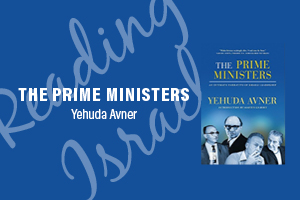Book Review: The Prime Ministers

Seeking a greater knowledge and understanding of Israeli politics and recent history is probably one of the main reasons someone would pick up “The Prime Ministers”, find it interesting, but ultimately be intimidated by its robust spine. 703 pages is a daunting task for even an avid book reader. Get over your fear of not finishing, I can tell you right now I didn’t finish the book but still found the experience worthwhile.
This book is not necessarily written to be read cover to cover. It can be read in fragments, used for research, or perused periodically. The table of contents is more of a timeline than a storyline You can easily choose a Prime Minister’s term or a specific war to read about. In this way, the book can be used as a resource - for Levi Eshkol or the Irgun, for Golda or Ben Gurion, for diplomatic successes or legislative challenges - thus, breaking the book down into 50-100 page segments.
Less daunting? I think so.
It is fascinating to think that the author, Yehuda Avner, intimately knew each of these influential people as their speechwriter and an intimate part of the Prime Minister’s staff. He has the authority to write on historical Israeli societal and political events, as he witnessed most of them firsthand, as both a citizen and a political figure. While the author has such authority, he also writes about different people and events from a biased perspective.
The reader should be astutely aware of said bias, although in my opinion, it should not be too difficult to discern. For example, the author gives a brief description of the different principal characters found throughout the book. In his description of Menachem Begin the author writes, “Israel’s most extraordinary prime minister, infused with an overwhelming sense of Jewish history, a man of acute integrity, vision and compassion...” (Avner, 15). Obviously, the author is giving his own opinion in some matters. This opinion can also help inform the reader where the author is politically aligned and what he values. These are important aspects to keep in mind while reading.
Despite the bias, the book is a fascinating account of Israel throughout different time periods. Most of the information is not common knowledge to diaspora Jews such as myself. There is an astonishing amount of information that I was not informed of such as the Irgun and problems with the British soldiers before independence. The books starts before independence with Beginites, then gives an emotional account of Independence Day, then Levi Eshkol’s term, Golda Meir, Yitzak Rabin, and ending with Menachem Begin who has more than double the chapters than any other prime minister.
It’s easy to pick and choose what you want to learn more about (especially if you want to learn more about Begin’s prime ministership). The point is to take a book that is 703 pages long and look at it in pieces of 100. Each 100 pages describes a different time in Israel’s history. Take it 100 pages at a time to proceed according to time, as the events unfolded. Alternatively, jump to the Prime Minister or event you want to know more about. These “bite-sized” chunks of history provide wonderful insight about Israel from the perspective of a man who was actually there when these things occurred.
Recommended:
READING ISRAEL BOOK CLUB
Get Started Reading Israel today!
About the Author









